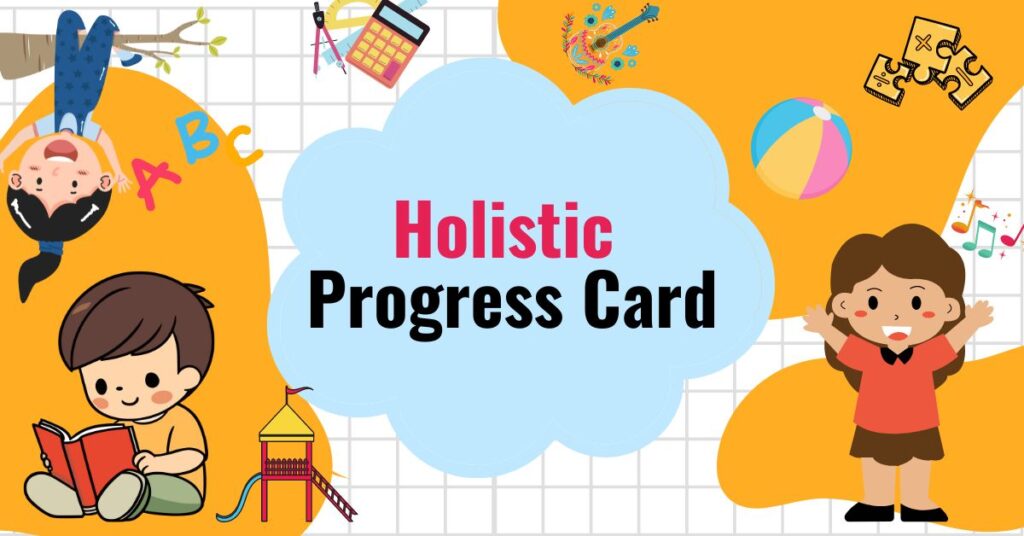Einstein and Thomas Edison had the greatest minds but still had to endured challenging experiences sad during their students’ years where they felt underestimated due to rigid educational system. Their journeys underscore the importance of recognizing that a child’s potential transcends mere academic marks.
Introduction to Holistic Progress card and PARAKH
As per the New Educational Policy (NEP), NCERT has shed light on modifying the education system and shifting the focus of a child’s progress from solely assessment-based to beneficial aspects of a child’s development.
PARAKH – Performance Assessment, Review, and Analysis of Knowledge for Holistic
Development is a standard- setting body under the NCERT. It has taken an initiative to eliminate
traditional report card and has deviced the Holistic Progress Card ( HPC) for the following
stages:
- FOUNDATIONAL STAGE for classes 1 and 2
- PREPARATORY STAGE for classes 3 to 5
- MIDDLE STAGE for classes 6 to 8
It is currently working for developing it for the secondary stage.
What are the major changes?
Previously, in traditional methods, the focus was primarily on examination marks, whereas, as per the upcoming educational system, it will be more learner-centric with holistic progress card. The responsibility for the development of a child will no longer purely rest on teachers; rather, parents, peers, students themselves, along with teachers, will play a major role in evaluation and development. The ‘learner-centric’ approach that is assessed in holistic progress card focuses on various aspects such as diverse skills and competencies rather than marks obtained in periodic examinations.
Progress of the child on holistic progress card will be monitored not only on student’s acdemic performance but also on the following basis:
- project based and inquiry based learning
- quizzes
- role plays
- group work
- Student’s Portfolio
- Teacher’s assessment
Students’ cognitive, socio emotional abilities and creativity during class activities will be
monitored in detail.
The unique part of the change is that student herself will get the chance to play a part in formation of the Holistic Progress Card. Each student has to reflect on their own progress at the end of an activity by circling statements such as – “I was able to learn something new” or “I was able to express my creativity” or “I was able to help others in some way”.
At the middle stage ( for classes 6-8) students are also required to fill in their expectations from a teacher with respect to areas where they need help. Also, the ”ambition card” is been introduced at the middle stage where students are required to fill their ambitions and the habits which need to be adapted to achieve the ambition.
Who will be the part of the formation of Holistic Progress Card?
Traditionally, the sole responsibility used to fall on teacher in maintaining the student’s report card on the basis of class performance , behaviour and marks obtained but now the roles of creating the Holistic Progress Card of the child has been diversified. Along with the teachers
Following will be the part of the process:
PARENTS
The HPC aims at linking home and school by making parents an integral part in child’s learning process. The inputs of parents, such as the child’s ability to do homework and managing screen time with activities, will be required. Parents can fill in the information if comfortable or even report it to teachers, who can then fill the HPC based on the parent’s information.
PEERS
The recent evaluation system gives importance to peer evaluation as well. The classmates play an important role in judging the peer’s performance. Each student has to circle descriptive indicators of progress like classmates were able to “understand the activity”, “were able to support me or the teacher in the activity” or “were able to contribute to the success of activity”.
STUDENTS
A student herself will be able to be the part of her Holistic Progress Card. She will be able to assess whether she liked doing certain activity or required any further help with the task assigned. The assessment rubics will assess Awareness, Sensitivity and Creativity. The assessment criterion will not be with the marks or grades but with the following innovative words:
- Stream – The child is at beginner level and the performance is low.
- Mountain- The is at progressive level and the performance is moderate
- Sky- The child is at advanced level and performance is excellent.
The new methods and approaches adopted by NCERT aim to create an education system that
caters to the overall development of the child. We hope to see positive changes and increased
involvement of parents and peers in witnessing the child’s growth and excellence.
Interested in knowing about will the AI replace human jobs? Click here to read

